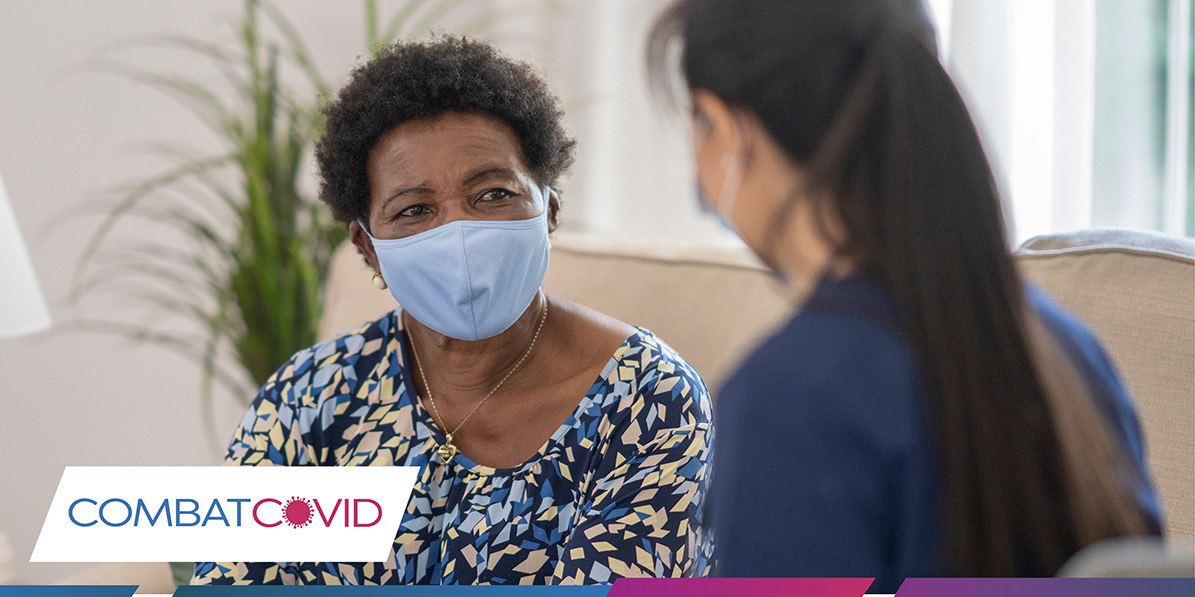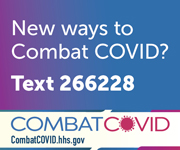If you’ve tested positive for COVID-19, one of the first questions you may have is, What can I do to reduce the risk of getting sicker? The good news is, there are treatments that may reduce that risk. Depending on your age, health history, and how long you’ve had symptoms of COVID-19, you may qualify for a promising form of treatment for the disease. It’s called antiviral treatment.
Some early evidence suggests that treatment can reduce the amount of the SARS-CoV-2 virus (which causes COVID-19) in a person's system. This amount is known as viral load. Having a lower viral load means you may have milder symptoms thereby decreasing the chance of you needing to stay in the hospital.
There are several COVID-19 treatment options available for those who have tested positive and are experiencing symptoms:
- Paxlovid is authorized for the treatment of mild-to-moderate COVID-19 in adults and pediatric patients (12 years of age and older weighing at least 40 kg) with positive results of direct SARS-CoV-2 viral testing, and who are at high risk for progression to severe COVID-19, including hospitalization or death.
- Veklury is approved for the treatment of adults and pediatric patients (28 days of age and older and weighing at least 3 kg) with positive results of direct SARS-CoV-2 viral testing, who are not hospitalized and have mild-to-moderate COVID-19 and are at high risk for progression to severe COVID-19, including hospitalization or death.
- Lagevrio is authorized for the treatment of mild-to-moderate COVID-19 in adults with positive results of direct SARS-CoV-2 viral testing who are at high risk for progression to severe COVID-19, including hospitalization or death, and for whom alternative COVID-19 treatment options approved or authorized by FDA are not accessible or clinically appropriate.
Each of these mAB (monoclonal antibody) treatments have lost authorization due to their ineffectiveness against the Omicron variant:
- On Jan. 24, 2022, HHS and FDA announced that BAM/ETE and REGEN-COV are not currently authorized for use in the US
- On April 5, 2022, HHS and the FDA announced that sotrovimab is not currently authorized in the US
- On Nov. 30, 2022, HHS and the FDA announced that bebtelovimab is not currently authorized in the US
Visit the FDA page Know Your Treatment Options for COVID-19 page to learn more.
How Much Will the Treatment Cost? Is It Covered by Insurance?
- Visit the US Department of Health and Human Services' Administration for Strategic Preparedness and Response COVID-19 Therapeutics Transition to Commercial Distribution: Frequently Asked Questions to learn about how the transition of COVID-19 Therapeutics to the commerical market affects uninsured and underinsured individuals.
- For patients covered under commercial insurance plans, costs may vary, but many large insurers are waiving all costs. Check with your health plan.
- If you do not have insurance, you should ask the treatment facility if there are charges.
Treatment Updates
On May 25, 2023, The FDA approved Paxlovid as the first oral antiviral for treatment of COVID-19 in adults.
On November 30, 2022, HHS and the FDA announced that Bebtelovimab is not currently authorized in the US because they not expected to neutralize Omicron subvariants BQ.1 and BQ.1.1.
On April 5, 2022, HHS and the FDA announced that Sotrovimab is not currently authorized in the US because they are not considered effective against the BA.2 variant.
The FDA had granted Emergency Use Approvals (EUAs) for several mAb treatments: etesevimab and bamlanivimab (BAM/ETE), REGEN-COV (casirivimab and imdevimab), and sotrovimab. On Jan. 24, 2022, HHS and FDA announced that BAM/ETE and REGEN-COV are not currently authorized for use in the US because they are not considered effective against the Omicron variant. CDC estimates that Omicron is greater than 99 percent of new infections nationally. Sotrovimab is effective against Omicron and can still be used as treatment for people who test positive for COVID-19 to help prevent progression to severe disease in people at risk. Evusheld is another monoclonal antibody effective against omicron that is specifically for pre-exposure prophylaxis for people with immunocompromising conditions.
Monoclonal antibody (mAb) treatments reduce hospitalizations and deaths among those affected by COVID-19. Expanding access to these treatments is integral to our focus on saving lives. DHEC and partner efforts have now guaranteed availability of monoclonal antibody treatments within 50 miles of every South Carolina resident, with most living within 25 miles of a treatment site.
South Carolina has 11,710 mAb treatments currently available for eligible residents. To date, 38,937 COVID-19 patients in South Carolina have been treated with monoclonal antibodies.
Recent shortages of monoclonal antibodies (mAb) for use in the treatment of patients with COVID-19 in South Carolina have been resolved at this time, and South Carolina now has sufficient supplies to provide for every resident who could benefit from these effective treatments. DHEC encourages healthcare facilities, providers, and eligible patients to take advantage of this treatment.
South Carolina currently has 11,534 mAb treatments available for eligible residents. To date, 32,686 COVID-19 patients in South Carolina have been treated with monoclonal antibodies.
News release: DHEC Encourages Use of Monoclonal Antibody Treatments for COVID-19
The federal government has informed each state that there is a national shortage of monoclonal antibodies. As a result, South Carolina will only receive 4,460 doses for this week's allocation to be distributed next week. In contrast, facilities across the state already have orders for 13,000 doses pending.
Due to the shortage, DHEC is determining the allocations for monoclonal antibody treatment sites in the state based on the amount the state will receive, sites' utilization rates, and access. We are quickly working on the details with the goal of assisting as many South Carolinians as we can with this successful treatment.
It is important to remember that monoclonal antibody treatment is not a substitute for COVID-19 vaccination. Those looking to protect themselves against COVID-19 are strongly encouraged to get fully vaccinated as soon as possible. Vaccines are safe, effective, and available for free at thousands of locations across the state.
In July 2021, the FDA authorized use of monoclonal antibodies as post-exposure prophylaxis (PEP) for people who are unvaccinated or vaccinated, have come into contact with the virus, and are at higher risk for severe COVID-19. Those at high risk include people who are older than 65, overweight (BMI greater than 25), have diabetes, chronic kidney, heart or lung disease, who are pregnant, or have weakened immune systems. The monoclonal antibodies can be given by intravenous (IV) infusion or a series of subcutaneous (SQ) shots. PEP can reduce the risk of infection of household contacts of infected people by as much as 81 percent. Monoclonal antibodies are safe, free, and highly effective but they need to be given within the first 10 days after symptoms developed or within 10 days of exposure if given as PEP.
COVID-19 Therapeutic Treatment Locations
Please see the map of locations below. mAb treatment must be recommended by a healthcare professional based on a person’s health history and how long they’ve had symptoms of COVID-19. A person can’t simply show up at one of these locations without a referral.

